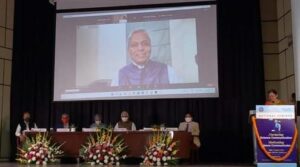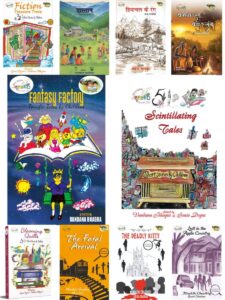 PIB Delhi – Communicating to political leaders, bureaucrats, scientists, students and public at one go as our targeted audience is a huge challenge. These days extraordinary information is available, but a focused communication with an ability to distill the garbage is a crucial challenge. Disinformation and misinformation are easy to communicate, as it does not have any credibility, but transmitting correct and scientific information is a bigger issue. For example, salt, fat and sugar are very easy to get addicted to, but the absence of these three in a healthy diet are very difficult to take. Prof K. VijayRaghavan, Principal Scientific Adviser to Govt. of India was addressing the national seminar on science communication, organized by the CSIR-National Institute of Science Communication and Policy Research (NIScPR) on 10 March 2022.
PIB Delhi – Communicating to political leaders, bureaucrats, scientists, students and public at one go as our targeted audience is a huge challenge. These days extraordinary information is available, but a focused communication with an ability to distill the garbage is a crucial challenge. Disinformation and misinformation are easy to communicate, as it does not have any credibility, but transmitting correct and scientific information is a bigger issue. For example, salt, fat and sugar are very easy to get addicted to, but the absence of these three in a healthy diet are very difficult to take. Prof K. VijayRaghavan, Principal Scientific Adviser to Govt. of India was addressing the national seminar on science communication, organized by the CSIR-National Institute of Science Communication and Policy Research (NIScPR) on 10 March 2022.
The Seminar was organized in hybrid mode at the CSIR-NPL auditorium, New Delhi and its central theme was “Nurturing Science Communication – Motivating Science Communicators”. In this seminar around 15 institutions engaged in science communication came together on a single platform to share their views and ideas for strengthening the science communication efforts. In his presidential remarks, Dr Shekhar C. Mande, Director-General, CSIR asserted that we all need to be better communicators. Good communication skills and knowledge of history can be improvised upon, for us to be better communicators. As a scientist, we need to understand the science and technology involved as to how it was done 100 years ago and how things have changed. So will it be that after 100 years from now, people will be amazed, as to how we handled the issues. As scientists, we take prestige in peer reviewed journals, social scientists take pride in how it has changed the human life. But to involve the general public all the time about all the activities with the applications is the role of science communicators.
We are short of people who can connect with general mass and scientists’ happening behind the walls. Distinguished Guest of the Seminar, Dr Sharmila Mande, Chief Scientist with TCS Research, Tata Consultancy said, “Science lab work changes peoples’ livies, but school children need to know what’s happening in the world of science. Future of healthcare is going to depend on preventive and scientific advances. Predicting diseases based on the drop of blood or a stool is in the offing. Scientific endeavors need to be made known in a simplistic manner in the form of book, animation, etc.” Guest of Honour Prof Venugopal Achanta, Director, CSIR-National Physical Laboratory (CSIR-NPL) said that science communicators should not focus only on reporting research published in foreign journals. There is considerable research being carried out on local problems. These need to be communicated as well, Prof Achanta added. The second session was focused on Showcasing Science Communication initiatives. Dr C.M. Nautiyal chaired the session.
The panelists included; Dr Rashmi Sharma, Scientist, DST – Augmenting Writing Skills for Articulating Research (AWSAR); Dr Arvind C. Ranade, Scientist, Vigyan Prasar – VIPNET; Kapil Tripathi, Scientist, Vigyan Prasar – India Science Channel – Tarun Jain, Editor, Vaigyanik Drishtikon; Zubair Siddiqui – Srote Science & Technology Features (Eklavya); and Ms Sonali Nagar, Scientist, CSIR-NIScPR. The Program began with the welcome of delegates by Dr Sandhya Wakdikar, Senior Principal Scientist at CSIR-NIScPR. Prof Ranjana Aggarwal, Director CSIR-NIScPR gave introductory remarks to the report and the program. Dr Sharmila Mande was the Chief Guest of the program who shared her experiences on balancing work with life. The Women leaders of CSIR who shared their experiences with the audience were Dr Suman Kumari Mishra Director CSIR-CGCRI; Dr Geeta Vani Rayasam Head, CSIR-HRDG; Dr Vibha Malhotra, Head, IPU & TMD; Dr Purnima Rupal, Head DGED & SCDD, CSIR; Dr V.J. Sattigeri, Head, TKDL; Dr Rama Swami Bansal, Head, ISTAD. This was followed by an interactive discussion on the topic.



